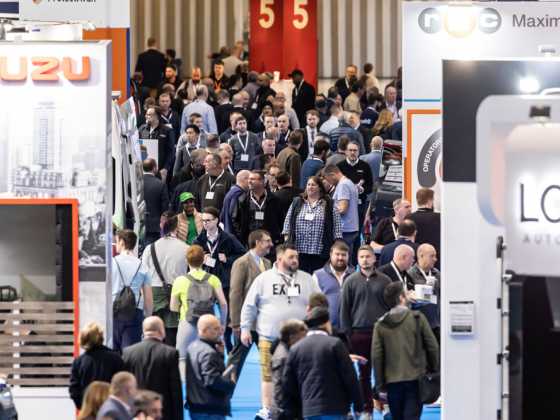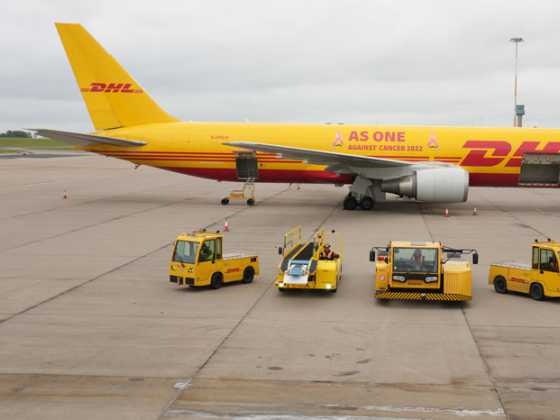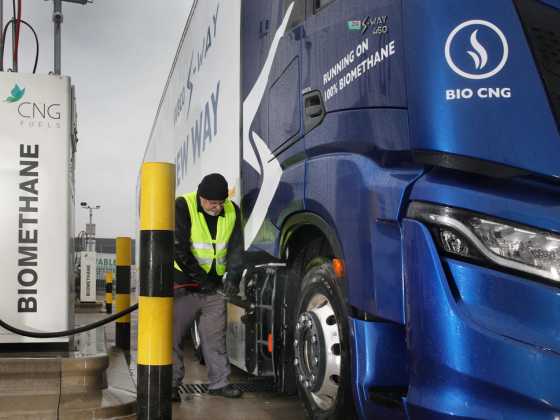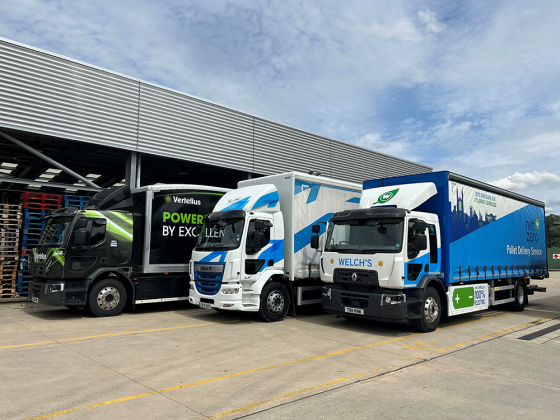Green van man
With a handful of electric vans entering the market in recent months, the Freight Transport Association undertook a survey to find out what van operators thought about going electric
 Hardly a month seems to go by without the announcement of a new electric offering from van manufacturers. Electric vans (EVs) are often touted as the way forward for operators looking to boost their green credentials. But what is the experience of the early adopters and what’s holding back others from taking the plunge?
Hardly a month seems to go by without the announcement of a new electric offering from van manufacturers. Electric vans (EVs) are often touted as the way forward for operators looking to boost their green credentials. But what is the experience of the early adopters and what’s holding back others from taking the plunge?
A recent survey conducted by the Freight Transport Association’s Van Excellence programme showed that many van operators are adopting a ‘wait and see’ policy with almost 70 per cent either having not yet adopted the technology or stating they are unlikely to do so within the next 12 months or so.
So what are the lessons learnt from early adopters? The aims of the early adopters are laudable; their keenness to lead from the front and benefit from the potential environmental and cost benefits of EVs should be recognised, as should the feedback they are able to pass on to others considering electric vans.
What users found massively attractive were the reduced operational costs, ease of maintenance, minimal noise pollution and ‘in use’ CO2 benefits. Another major plus is the positive PR message, particularly if the electricity used to charge is sourced from ‘green’ providers.
That said, the reality of the day-to-day use isn’t quite as rosy, however. The message from early adopters suggests a cautious and well-researched approach to other users.
FTA asked operators to score how well their vehicles had met expectations. Their response was decidedly average with only around a third declaring they’d met or come close to meeting their expectations.
179 van operating FTA members responded to this survey. Respondents represented a wide range of fleet sizes and types of operation.
WHAT WERE THE ISSUES
The significant up-front and whole-life costs cannot be ignored and neither can the limitations on range. Rory Morgan of Iron Mountain advices potential users “to be absolutely sure of the route they want to use the vehicle on. Is the vehicles’ range sufficient in real life operations when loaded with other demands on the batteries such as lights, wipers, heaters etc? Can they justify the costs; the vast majority of EVs are hugely expensive compared to their diesel equivalents. Are there other options?”
Best practice would suggest interested operators conduct trials in as close to ‘real life’ conditions as possible. These trials should range across as many variants of operation as possible, including range on single charge, with different types of charging points and
voltage/phase requirement, different payloads and with different drivers in varying weather and traffic conditions. If the EV is being considered for use in a specific environment or on a particular route then it goes without saying it should be tested in that role.
The importance of robust trials was underlined by Vince Dignam, Transport Manager at the Corporation of London, but
even so the longer term reliability of vehicles was questioned. Vince noted that ‘vehicle off road’ time can be excessive with the ability of repairers to work with new technology and disputes around responsibility for faults cited as reasons. Other respondents identified issues with older EVs where the original providers had ceased trading.
OTHER OBSERVATIONS
The competence and attitude of drivers is seen as being an important in the successful use of EVs. The allocation and training of specific drivers is to be recommended, as one survey respondent commented: “There is a particular style of driving with an EV compared to a standard fuelled vehicle. Training is essential to ensure the driver gets the best possible results and charge life from the vehicle.”
Another tip was to allocate the vehicles to specific roles where the operator is confident the vehicle is within its operational abilities. Van Excellence member at a major facilities management provider said: “One EV is being used for park maintenance in the Midlands which fits with the range of the vehicle. We also have a more extensive fleet used in a London Borough – they are caged vehicles which are used to collect waste items from households in the area. Again, these are planned routes so the distances are known prior to the vehicle commencing operation.”
THOUGHTS FROM NON-USERS
Worries about operational range topped the list of concerns with almost three‑quarters of respondents citing this as a barrier. As you’d expect the upfront cost of vehicles continues to be a disincentive to adopt electric vans although the recent extension of the plug-in grant along with ever-increasing diesel costs is likely to make adoption more attractive.
Other issues identified included worries about the availability of a robust charging infrastructure and, interestingly, the loss of payload making it difficult for operators to keep below the 3.5t operator licence threshold, an issue already identified by Van Excellence operators.
A ROLE TO PLAY IN THE RIGHT ROLE
Of the operators already running electric vans there is clear evidence that used correctly EVs can have a role to play in the right role. Particularly amongst the larger fleets, almost all the existing users expected to increase their use in the next year and some 15 per cent of non‑users expected to have joined the electric van club during the same period.
Electric vans potentially provide significant environmental benefits in appropriate operating environment. Low mileage urban operations with vans returning to a specific location (equipped with charging facilities) clearly lend themselves to the use of such vehicles.
Makers need to build operators confidence in the technology and work with the remarketers to address uncertainty of residual values.
Government, both central and local, can play its part in establishing a robust recharging infrastructure. Central Government can also clearly encourage adoption with financial incentives such as the plug-in grant and by providing a concession in the operator licensing regulations to allow operators of electric vans to offset the impact on payload from the weight of the traction batteries.
There does also seem to be a useful role for hybrid technology as a viable halfway house given the issues around charging networks and vehicle range.
A CRUCIAL INDUSTRY
Over one in 10 of vehicles on UK roads can be classified as a van. That’s a total of over 3.2 million; a number that continues to grow at over 10 per cent year on year.
Vans are an integral part of our working lives with one in 12 of the UK’s working population driving them as part of their job.
Vans are doing vital work. Over 70 per cent are mobile workshops running loaded with the tools and materials allowing houses, schools, hospital, machinery and roads to be built and maintained. The rest fulfil a myriad of roles delivering and collecting all those day-to-day items we all take for granted.
A life without vans is almost unimaginable, impacting a it does on practically every sector – from utilities and construction to retail, home deliveries and local authorities, and everything in between.
However, outside of the freight and logistics industry itself, little credit is given to the great lengths that the responsible van operators take to ensure their fleets are safe, environmentally sound and efficiently run.
It was the desire for recognition of the great lengths many van operators go to in order to operate safely and efficiently that provided the spark for the FTA Van Excellence scheme.
Operators told the Freight Transport Association (FTA) that they wanted a recognised framework to work against – they wanted a definition of what ‘good’ looked like, and to work together to resist any suggestion of ‘truck-like’ legislation being imposed. They also wanted to show that by working together they could demonstrate vans are operated responsibly and there isn’t a problem to be fixed by legislation, and as a result the FTA formed Van Excellence.
THE VAN EXCELLENCE CODE
The Van Excellence Code calls for operators to be confident their drivers are qualified, competent and fit to drive. They should understand their responsibilities and their roles should be properly assessed for risk, understanding the speed limits for their vehicle and any other specialist requirements.
It calls for vehicles to be properly inspected, maintained and specified that they must be taxed, MOT’d and insured.
Launched in 2010, Van Excellence focuses on two goals: raising standards and recognising excellence.
The scheme was created ‘by the industry for the industry’ as operators were engaged from the very start in creating the Van Excellence Code. They then worked with FTA in developing the operator accreditation scheme and eventually formed the Van Excellence Governance Group to oversee the scheme with FTA.
There are now over 160 operators on the scheme who between them operate over 170,000 vans or around five per cent of the total number of vans on the UK’s roads. Van Excellence has created a unique information service for van operators with the Guide to Van Excellence – a straightforward and comprehensive guide on how to meet the standards of Van Excellence coupled with the kind of hands on support FTA is renowned for. Subscribers receive a monthly news email and have access to FTA’s highly rated Member Advice Centre for personal support.
FURTHER INFORMATION
www.fta.co.uk






